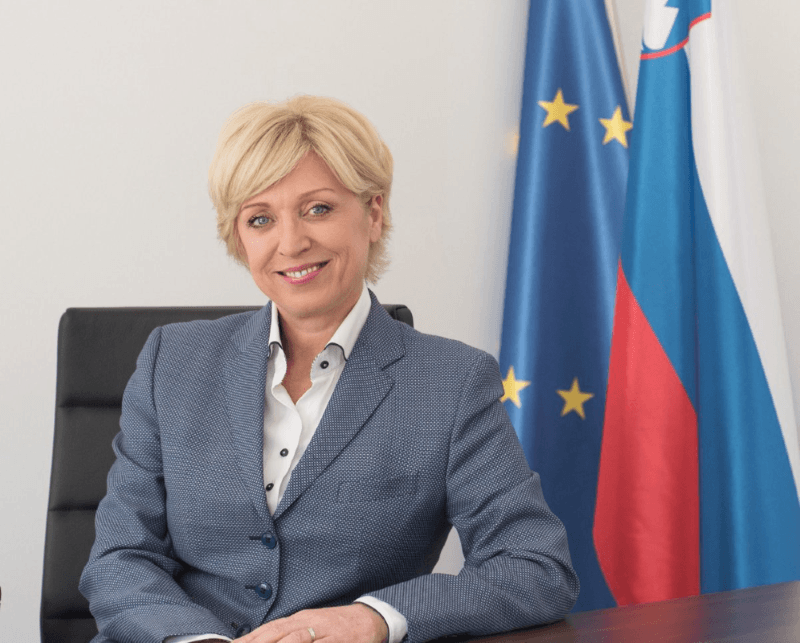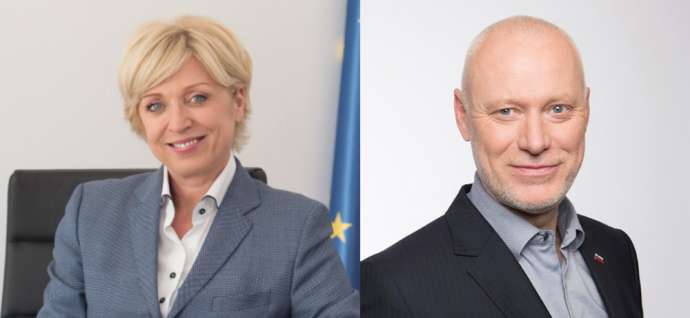Tomc a lot needs to be done for pensions and demographics
An economist by profession, Romana Tomc, 53, was re-elected to the European Parliament as the second-placed on the joint SDS+SLS slate. She was first elected MEP in 2014, which marked the peak of her political career and a rapid rise through the party's ranks at the time, giving rise to rumours she could take the party leadership while Janez Janša was shortly serving time in the Patria corruption case. As an MEP, she has been a member of the committee for employment and social affairs, and a member of the delegation for relations with Japan. She was the rapporteur for the Youth Employment Initiative, one of the main EU financial resources to help fight high unemployment rates among the young, and has fought, though in vain, against Austria's efforts to cut child benefit for Slovenian parents working in Austria but living in Slovenia. MEPRanking.eu, a quantitative analysis of MEP activity, however, shows she has been one of the three least active Slovenian MEPs in this term. In 2017, the SDS fielded her as a presidential candidate, but she failed to advance to the run-off, placing third after Borut Pahor and Marjan Šarec. Drawing on her rich experience from the private sector and employer organisations, Tomc joined the Labour Ministry in 2007, first as the head of the labour directorate and later as a state secretary in the SDS-led government. In 2011-2014, she served as MP, of which two years as deputy speaker. Tomc has a partner and two adult children.

STA, 27 May 2019 - The freshly re-elected MEP Romana Tomc of the Democrats (SDS) has told the STA that a lot of work remains to be done in the EU in the fields of pensions, older people and demographic trends. She intends to keep focusing on these fields in the next term, hoping that she will manage to "put some wheels in motion".
Tomc (53), who was re-elected to the European Parliament as the second-placed on the joint SDS+SLS slate, said her priorities would be connected with the work she had been already performing.
She noted that although she had worked a lot with young people in the outgoing term, she had paid the most attention to pensions, pension systems, demographic changes and population ageing.
She thinks that the EU owes a lot to its citizens in terms of demographic policy and pensions. "If we dealt with things such as clock changes, I think that we can also deal with serious things such as problems in the pension systems in all member states, not only in Slovenia."
Considering that all EU member states have problems in this field, Tomc believes that it is time for the EU institutions to commit to deal more intensively with the challenge.
In countries where governments are not being responsible, these systems are bursting at their seams, assessed the member of the largest opposition party, adding that Slovenia was among them. This is an issue that needs to be regulated anew.
"We discussed the issue of ageing, but did not adopt any measures. I think that we could adopt some binding commitments in this field," she said, while noting she was inclined to setting minimum standards.
Such standards would leave enough manoeuvring space to individual member states, while being means for Brussels to control whether a member state is taking measures they should be taking in order to make its pension system stable.
According to Tomc, the EU has dedicated a lot of money to projects such as bridges and other infrastructure, and now it is time to start investing in people.
As a case of good practice, she pointed to the youth guarantee scheme, for which the EU has earmarked EUR 9 billion. "Why wouldn't we have a guarantee scheme for older people," she wonders.
Milan Brglez will commit himself to human rights
Milan Brglez, 51, was elected MEP with preferential votes despite having just recently joined the SD after defecting from the Modern Centre Party (SMC) of former PM Miro Cerar, which he helped found just before it won the 2014 general election. It was then that Brglez, who has a PhD in international relations, entered politics, before which he was known mainly in academic circles. He was elected MP in 2014 and became parliamentary speaker, a post he held until 2018. During this stint, parliament stripped opposition SDS MP Janez Janša of his term as MP as he was serving time in the corruption Patria defence case, in what was perceived as a rather controversial move. As an expert on foreign relations, Brglez was also a member of the advisory group involved in the preparation of Slovenia's case for the tribunal arbitrating on the border with Croatia. In 2018, he was re-elected to the National Assembly on the SMC ticket, but defected soon over a dispute about the new parliamentary speaker with SMC leader Cerar during the talks on the coalition formation. He is a father of two children.

dr-rs.si
STA, 27 May 2019 - Milan Brglez, an international law professor who was elected one of two MEPs for the Social Democrats (SD) on Sunday, says he will dedicate his term to things he knows best, that is issues linked to international relations, international law and human rights, including social rights.
"This is such a surprise that I haven't given it much thought yet," Brglez, who made it to the European Parliament as No 4 SD candidate owing to preference vote, told the STA when asked about his future work.
However, Brglez, who served as the National Assembly speaker in the previous term, said that value added he would bring to the EU parliament was his "commitment to human rights and the rule of law", two topics that he believes are underrated and neglected in the EU.
Having defected to the Social Democrats from the Modern Centre Party (SMC) after the 2018 general election, Brglez says that in the European Parliament he will work toward a clearer social democratic profile, and will also dedicate his time to social rights, where he believes Europe should do much more.
He would like for "certain minimum standards to be adopted in the future so we don't compete for money when it comes to social security". However, a more detailed distribution of tasks will also depend on distribution of European Parliament seats between groups, he noted.
Brglez, who currently serves as deputy in the National Assembly, plans to first complete the work he has started in the Slovenian parliament before devoting his time fully to how he operates within the European Parliament. "Some expertise from this field will certainly help," he added.
Brglez is happy to have won his term with a preference vote. "I gather these are the votes of those new voters who supported social democracy and this was the basic goal that was behind our joint decision for me to stand," said Brglez.
As a result of his election to the European Parliament, the SMC will gain back Brglez's seat in the national legislature, considering that Brglez was elected on the SMC ticket before defecting to the SD last summer.
"That's the logic of parliamentarism, which I believe is right in principle, but as far as the SMC and I are concerned this part of the story is now over," said the 51-year old.
All the articles in this series are here







